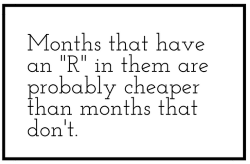Have you ever sat down and really done a budget for yourself—you know, the one that tracks income and expenses on a monthly basis? If crickets are chirping and you’re sliding down in your chair at the coffee shop, you’re not alone.
According to Gallup, only about one-third of us are keeping a monthly budget. High five if you’re one of them, but if you’re like me, it always seems to be something I’m going to do someday. Now, if today happens to be the day you are looking for your next Chicago rental apartment, getting a handle on the “true cost” of that place could mean the difference between living in the place you want vs settling for a place you think fits into your budget. Here are some tips to help you find your true rental budget!
Base Rent
This is the obvious one: base rent represents the market rate of rent you will be liable for once you sign your lease. While it is the biggest portion in calculating your total cost of renting, it may not be the biggest factor… huh? If that sounds strange, let’s dig in a little deeper.
Seasons
 The time of year you move can have a measurable effect on how much you can actually afford to spend renting in Chicago. It is not uncommon for the price of the exact same unit to change by 10% or more just based on the month you are moving.
The time of year you move can have a measurable effect on how much you can actually afford to spend renting in Chicago. It is not uncommon for the price of the exact same unit to change by 10% or more just based on the month you are moving.
On a base rent of $2,000, that could be $200 or more. Buildings are always trying to stagger their move-ins to maximize their rents, but a good general rule to follow is “months that have an ‘r’ in them are probably cheaper than months that don’t”. Share that with your friends!
Specials
Since there is a seasonality to Chicago’s rent prices, property managers are motivated to move inventory when the market is slower or they have more vacancies. Their way of renting inventory faster is to offer customers incentives, such as discounts on parking, look and lease specials, or free rent.
All of these can play into the net price you pay, bringing down your total cost. Take one month of free rent as an example: you’re lowering your net effective monthly rent simply by choosing a building that is offering a promotion.
Keep in mind that specials are exactly that: “special” and can disappear at any time, so if you are considering the cost of a special into your total cost of rent, make sure you pay close attention to how long they last or how long you have to take advantage of the deal. We can definitely help you decide!
Utilities
In my experience, utilities are the least understood cost in the equation, mostly because Chicago apartment rents can be quoted with some, all or no utilities in the rent price. Keeping track can be confusing.
Let’s look at a scenario I see all the time. You are offered an apartment that is $1800 rent, but it’s over your $1,700 “rent only” budget so you decide not to see it. You are so focused on your rent budget that you completely forget about your utility expenses, and you miss out on seeing a great apartment.
How could this have gone differently? Well, after looking at your current utility costs, it turns out you spend $200 a month for heat, air conditioning, water, sewer, trash, cable and internet. A closer look at that $1,800 unit shows that the price includes all the same utilities except cable. If you can add cable for less than $100, you’re within budget for your total cost of renting. You can afford that $1,800 apartment! Rents and utilities can be tricky, but we have easy tools to help you calculate these costs.
Parking
Coming from Indiana, the idea that parking was not included in most Chicago rentals was a shock. This added expense, which averages around $225-$250, is an expected cost for some people, but a deal breaker for others.
Some neighborhoods, like the Loop or Streeterville, typically have garage parking only, with limited cases where valet parking is required. The good news, however, is that there are buildings in some neighborhoods, like South Loop or River West where paid garage, free street, and permit street parking are all available. If you’re open to braving a few winter months, street parking is a great, cash saving alternative. Put those savings into your apartment…I mean you’re gonna live in your apartment, not your car!
Laundry
I’m not gonna lie—I didn’t really think about the actual cost of laundry until I got in this business. But, a few dollars here and a few dollars there and man, it starts to add up!
The apartment buildings we work with here in Chicago all have in-unit washers and dryers or laundry facilities on-site. The premium to get an in-unit washer and dryer is typically $50-$100 a month, and the average cost of doing laundry ranges from $3-$5 per load, so now you have some math to do! How many loads do you do a month? How many times do you run those heavy sweaters through the dryer? Picking the right type of laundry set-up is really about which resource is most valuable to you: time or money.
Commute
If you ask me, the only good thing about a commute is not having one! But, not all of us are able to pull that off, so I’ve found a simple guideline to help you cost out your commute: the further it is, the more it will cost! Walking is free, so if you find a place you love and can walk to work, you’ve reached nirvana in my book.
If being close to a train or bus makes it easy to get to work, a $100/mo CTA pass should do just the trick. At roughly $5/day, there’s no wear and tear on your car, no fill-ups, and no insurance or car payments. However, sometimes living in the City is just too compelling and driving to work is the only way to make that happen. If you drive 30 miles per day, Uncle Sam would say that is costing you about $16 a day. So, what’s this all mean? Consider the cost of your commute when it comes to picking your perfect place… you might be surprised how much more apartment you can afford, not to mention how much exercise you can get, by choosing to live in downtown Chicago.
Coming up with a rent budget is easy. Figuring out your “total cost of renting” takes a little more work. But, if you are looking to get the best apartment you can reasonably afford, consider all of these factors. A few hundred dollars difference might be the difference between a house and a “home!”
Did you know that working with a leasing agent is free? Get in touch with HotSpot Rentals and we’ll hook you up with our total cost of living tools, to you estimate your rent cost.
Similar posts
-

Advice and Tips
Apartment Living
Search Tips
Explaining Net Effective Rent and What it Means for Chicago Renters
-

Advice and Tips
Apartment Living
Chicago Neighborhoods
The Most Bike-Friendly Neighborhoods in Chicago
-

Advice and Tips
Apartment Living
Luxury Apartments in Chicago
Understanding the Chicago Apartment Application Process
